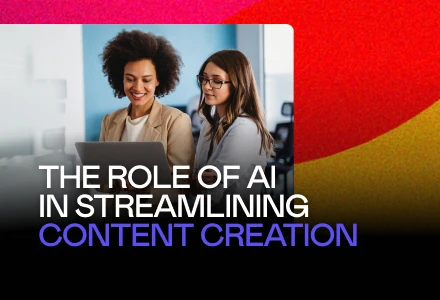
How to choose a headless CMS for your organization
Kontent.ai Team
Every piece of content your team creates is a chance to connect with your audience. But how do you take your content from good to great? And what’s this content value chain all about? It might sound like a lot, but don’t worry—our white paper covers everything you need to know.
As content creators, we understand that there’s much more to content than just words on a web page. Content has the power to be an incredibly crucial strategic asset for organizations. Take a moment to consider the following:
Content serves a practical purpose by providing information, entertainment, or solutions to your audience’s needs. Truly useful content adds value to the consumer experience, whether it’s educating them about a product, inspiring using compelling stories, or entertaining them with engaging multimedia.
Content shapes the perception of your brand. It’s the voice that speaks directly to your audience, conveying values, expertise, and personality. Consistent, high-quality content builds trust and credibility, enhancing your brand reputation.
Every piece of content is also an opportunity to make a lasting impression on the audience. Each piece, no matter how long or short, contributes to the overall narrative that defines your brand in the eyes of your audience. By crafting compelling and authentic content, you can control the narrative surrounding your brand, leaving a positive and memorable impression on the world.
At Kontent.ai, we’ve been helping organizations in almost every industry get the most out of their operations and content for almost a decade now. We’re always keen to share our insights and experience with content professionals.
To anchor the practical advice we’ll share, let’s first align on three critical concepts: content quality, velocity, and availability. You can use the included mini checklists to help gauge or confirm possible gaps or areas of improvement in your content operations. While you may have content quality covered, you may find opportunities to improve velocity or availability.
Remember, the interplay between these aspects is key; we’ve seen that success lies in strategically iterating over time, rather than trying to overhaul everything all at once.
Save the white paper to your inbox.
Content quality involves ensuring that the produced content is relevant to your audience’s interests and needs, accurate in its information, consistent in its messaging across platforms, and capable of addressing specific problems. The stakes are high when your content falls short of these standards, risking disengagement, loss of credibility, and missed opportunities to connect with your audience effectively.
Through their content marketing initiatives, Red Bull consistently delivers engaging and relevant content that resonates with their target audience of sports enthusiasts and thrill seekers. They reach an outstanding brand awareness of 91% among US energy drink consumers and are popular with 43 percent of them. By maintaining a high standard of content quality, Red Bull has successfully built a passionate community of fans and customers who identify with their brand and eagerly consume their content across various platforms.
Content velocity is the speed at which content is produced and delivered to meet the ever-changing demands and trends of your audience. It can be hard to pull off, especially when quality is so important. You don’t have to hit every point in the checklist below perfectly, but adopting a just-in-time approach to content creation ensures that your content is timely and relevant. Slow content velocity can lead to missed opportunities to engage with your audience, falling behind competitors who are more agile, and a decline in brand visibility.
When a power outage unexpectedly plunged the Superdome stadium into darkness during the 2013 Super Bowl, Oreo seized the moment—they swiftly crafted and tweeted a single message (“You can still dunk in the dark”) that went viral with over 16,000 retweets and 20,000 Facebook likes—major engagement for 2013 and something we’re still talking about years later! Oreo’s latest campaign reimagines the “hamburger menu” icon as a stack of Oreo cookies, calling it “The Oreo Menu,” and turns web menu words into promo codes for discounts at Kroger stores. It’s a playful treasure hunt that shows how Oreo loves to make the most of every moment. So, how can you make velocity work for you like Oreo makes it work for them?
Content availability can be challenging because it often requires coordination beyond the content team. It’s about making sure your content is easily accessible across various channels and platforms like websites, social media, email, and mobile apps. If content isn’t available where your audience expects to find it, you might see a drop in website traffic, conversion rates, and overall market competitiveness. Again, not every checkbox below is feasible to cover ASAP, but ensuring broad availability is key.
Knab is the first and largest “neo-bank” of the Netherlands, which means they offer their services to freelancers and entrepreneurs in a non-traditional way without the need for a physical location. They focus on providing a seamless and consistent experience across all devices, ensuring that customers can manage their bank accounts, pensions, insurance, and mortgages effortlessly. Knab’s innovative digital solution and user-friendly interface empower customers to handle their finances with ease and confidence, no matter where they are or what device they’re using. We’re proud to have them as a Kontent.ai customer!
Feeling motivated to make some tweaks to how things are done at your organization? Your next steps may lie in the steps of your content value chain.
There are a lot of terms related to moving content from ideation to publication and beyond—like the content lifecycle, content supply chain, content development, and more. We find it’s easiest and most actionable to think about content production as a “value chain”.
Why? A value chain charts the progression of goods from inputs into outputs and onward to their distribution and servicing. A content value chain shapes the value of content across different steps of content operations. This shift in perspective, especially for large organizations, helps keep the focus on the business imperative to improve the quality, velocity, and availability of your content.
To make targeted, practical tweaks to your content value chain, it’s important to have four key aspects of content management well-sorted, as these influence success at every step. Make sure your CMS supports your organization in these larger operational aspects, so that your people, processes, and technology work smoothly in tandem.
Behind every great content value chain should be data and insights that help you uncover bottlenecks, fix inefficiencies, and spot new opportunities, so that you get the most out of your content teams’ efforts. Issues like poor workflow design, delays in the content review stage, or unclear task assignments can feel like isolated frustrations in the moment, but taken together, they’re all standing in the way of great content. So, let’s see how you can get your content value chain running smoother than ever.
Great content is possible. To comfortably manage the unique interplay of content quality, velocity, and availability, you need data. Really, really good data. Data about your people. Your processes. Your content. All in one place. But how exactly can you achieve that?
Get your complimentary copy of the white paper to discover:

Kontent.ai Team

Kontent.ai Team
Start your journey with Kontent.ai. We’ll show you how to achieve an unparalleled return on your content.